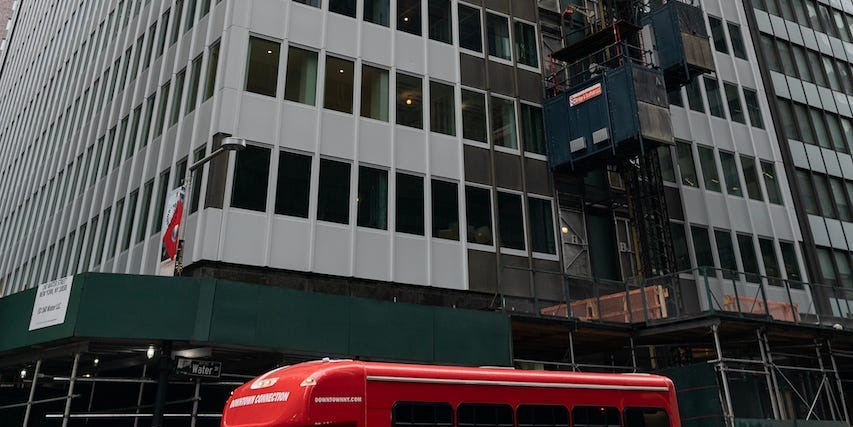mixed offices and apartments in the same building sounds good… would cut the commute
I see no way this could go horribly wrong https://en.wikipedia.org/wiki/Company_town
Mixed use buildings for actually quite common in much of the world and can work quite well. See what you do though is you put them on the market for anybody to rent, and not force people to live in your company housing.
If you go into any major city you’re going to run into mixed use buildings.
Just live at work! I can see the LateStageCapitalism posts writing themselves
in the same building as a floor used for an office wouldn’t be living at work
vibes based analysis
You joke but if you have to go in it’s nice to be able to walk to work. I used to go home for lunch every day for example. I saved a bunch of money
* drools in Musk *
I think if companies are interested in cutting commute times, they’d normalize work from home. Doesn’t seem to be the case sadly
I lived in a building thay was mixed residential/office space in Buenos Aires. It was really good, during the week you saw movement in and out so it felt alive, ar night and weekends was pretty empty and calm, and you could throw parties without bothering the neighbors.
lets defy the government and do it either way
I worked in an office once that was large enough thst you could absolutely live in it without being caught
Think of the real estate investors! /s
Oh, I’m sure they’ll charge a minimum of $2k/month even for the shittiest of the shithole office apartments. They’ll get their money don’t worry.
Many ideas here sound like the projects built, starting in the 1930s. They had many failures and a few successes.
There are sometimes some strange issues with office construction.
There might be no plumbing in the locations people will want for toilets and baths and kitchens in the individual suites away from the core of the building. Same goes for retrofitted laundry facilities.
HVAC systems (in the US anyways) are often centrallized and might need a lot of retrofitting to make it work like a condo/apartment.
Kitchen ventilation
Windows might not open, can’t get to a fresh air source
Aside from that stuff, the issue of empty office buildings while we are experiencing unsustainable housing markets is begging for a solution to address the demand.
There will probably be a handy sum to be earned for construction companies who get efficient at conversions.
Also offices don’t require that all the rooms have access to natural light the way residential buildings do. That’s why office towers can be thicc blocks while apartment buildings often need to be U-shaped.
I wonder if it would be possible to require all future construction to be designed in a way that it could easily be switched between commercial/residential. Like each floor of an office building has to have plumbing roughed it to support x number of toilets/showers on each floor, stuff like that.
Really, really not necessary and really not practical.
Short answer is nope. Commercial and residential building codes are very different, as are the engineering requirements.
it’d be a lot of work resolving all those issues… but definitely doable. just have to find the maniac with money and drive that wants to do that
It’s not that there might not be plumbing, it’s that there is zero plumbing in most office buildings aside from one clustered section for floor where there’s 5 to 10 toilets for each gender.
On top of that, you have completely different mechanical systems. An office building for instance may have one single mechanical system for the entire building, whereas an apartment would need separate mechanical systems for each individual apartment.
Then you have the kitchens, bedrooms and interior partition walls that are vastly different than an office building, plus the requirements for exterior windows which precludes larger office buildings with deeper floor plates from being converted at all without demolishing the interior portion of the building. Curtain wall systems that may or may not be compatible between an office and residential building (non-operating windows)… Not to mention the stair and elevator systems are probably not going to work either.
So in the end you’re probably looking at gutting the building down to the structure and removing every piece of the building including the outer envelope, roof, all of the electrical plumbing and mechanical systems… In the end it may or may not be cheaper just to build a new building from the ground up.
Source: am architect. And yes, I have done conversions like this in the past.
Can you clarify for the laymen in the room what you mean by Mechanical Systems?
Heating and air conditioning.
Work from home? No. Home is at work.
yeah not a bad idea
Can we finally get mixed zoning??
Watching the Biden admin is wild. At one minute he’ll be escalating the wars in the Ukraine and Palestine, but the next he’ll be funding the NLRB and addressing the housing crisis in a way that improves walk-ability.
It’s like, he has two settings: “actually useful moderate” and “KILLKILLKILLKILL”
Unfortunately, this makes him the best US president since carter

he’ll be escalating the wars in the Ukraine
Eh???
US politicians only disagree (a little bit) on domestic policy, on foreign policy they’re all in lock-step. that used to feel like a truism, but it’s been proven very true.
Escalating the war in Ukraine? Please explain how the U.S. has “escalated” the full blown Russian invasion of Ukraine without sounding like a fool.
Show me on the doll where Biden addressed the housing crisis
Jesus Christ, Hexbear.
How are downtown luxury apartments solving the housing crisis?
love too fund the NLRB after publicly breaking the power of the rail unions and setting worker power back another decade
I don’t know who you are personally, and you may not realise it, but you’re parroting Russian propaganda. The only one here escalating is Russia when they kept bullying Ukraine and illegally annexed Crimea in 2014. The West have been chastised for letting Putin get away with Crimean annexation, instead of further sanction. Many countries have also thought a charm offensive might satiate Putin, essentially appeasing. But history has shown, appeasement never works because an egomaniac will never be satisfied. Putin thought that he’d get away with it again when he invaded the entirety of Ukraine, but didn’t realise it’s the red line for the West, and the Ukrainians put up a stiff fight.
LOL
Cope
With what exactly?
Russia getting stomped by a much smaller and normally less well equipped army.
If you listen to Russian cope, I’m sure this was all part of their glorious plan.
Excellent stuff from Dark Brandon. NICE!
There are 16,000,000 empty homes and 500,000 homeless. Office buildings aren’t going to be solving any real problem other than the people who own the building being shit out of luck
Please don’t provide this stat without context. It just promotes cynicism and despair. Reality is complex, and our solutions are going to have to be complex.
Many of these vacant homes are nowhere near major homeless populations. But office buildings often are.
https://ggwash.org/view/73234/vacant-houses-wont-solve-our-housing-crisis
Edit: If you prefer videos, here’s a good one: https://www.youtube.com/watch?v=3xZXdXxYBGU
More supply is more supply. It’ll probably drive rent down a bit, assuming the plan works. This makes little difference to unemployed homeless people and does nothing to address the fact that many wealthy people see homes as a tool to secure their capital, but it’s not nothing. Hopefully it will help some people who are on the brink be a bit more secure in their housing.
The corporate landlords will just buy them up and let them sit empty the way they have done with at least 4 highrises that I can think of off the top of my head in downtown San Diego. Sure they have rented some of them, but the majority of those buildings sit empty.
No one can afford rent on luxury apartments
Are they were they are needed? Would we need to move people across the county to fill them? Or are they kept mostly empty as a form of storing wealth?
Greedy real estate hogs and speculators are criminals imo.
Where did you get those numbers from? Where is your source?
https://www.gao.gov/homelessness#:~:text=Issue Summary,factors like higher rental prices.
https://www.nytimes.com/2023/02/03/business/economy/us-homeless-population-count.html
https://endhomelessness.org/homelessness-in-america/homelessness-statistics/state-of-homelessness/
https://www.datapandas.org/ranking/homeless-population-by-state
www.newsnationnow.com/us-news/report-how-many-homes-are-sitting-empty-in-your-state/amp/
https://www.nar.realtor/magazine/real-estate-news/16-million-homes-vacant-in-us
https://www.census.gov/library/stories/2023/05/vacant-seasonal-housing.html
Thanks Waluigis_Talking_Buttplug
There’s no kill like overkill lmao
And I want politicians to start living in trailer parks, projects, and section 8 housing in the parts of town that their policies are destroying.
So are you against retrofitting office buildings?
Only if tax money is being used to pay for it.
Why?
And take public transportation!
At least Biden took the train a lot. When he was a senator most people only knew him as the Amtrak guy.
Send Biden to Gaza and see how quick he stops sending armaments to Israel.
This is the best summary I could come up with:
(tldr: 2 sentences skipped)
Joe Biden’s administration has come up with a plan it thinks can help address the housing crisis: encouraging developers to turn unwanted office buildings into apartments.
Converting offices to residential properties can be challenging due to the expense of refitting, as well as complying with zoning laws and other regulations.
But the White House initiative will make more than $35 billion available from existing federal programs in the form of grants and low-interest loans to encourage developers to convert offices into residential.
(tldr: 2 sentences skipped)
Following the rise of home working when the pandemic struck and the reluctance of many employees to start commuting again five days a week, business districts have been struggling.
(tldr: 2 sentences skipped)
Last December Silverstein Properties, one of America’s largest commercial landlords, announced plans to raise more than $1.5 billion to convert unwanted office space into residential housing in markets ranging from New York to San Francisco.
(tldr: 6 sentences skipped)
Conversions are faster than new construction, 20% cheaper, and produce fewer greenhouse gas emissions, the White House added.
The original article contains 364 words, the summary contains 180 words. Saved 51%. I’m a bot and I’m open source!
This should also help liven up downtowns that become ghost towns after 5/6pm.
More people living there will support more of the things that keep an area lively.
How about instead of giving money to private companies in the hopes that they build housing you give that money to people so they can afford to live in all the housing that already exists.
Why do libs always make this shit more complicated than it needs to be
Now I don’t know whether to feel owned!
If the average Joe now has more money from the government, wouldn’t that drive the property prices up? Polish govt has a program where a mortgage is guaranteed to have 2% interest rate, while in reality the govt pays the difference between the 2% and the actual bank’s interest rate, and that just made the prices of housing increase.
The only way not to give money to already rich developers is to have the govt build houses on its own to compete with the developers themselves, which is I assume unthinkable in the US. That would literally be communism
Because they don’t actually support doing things to help people, they just want to give more money to the rich.
Because there isn’t enough housing that already exists.
According the the last census there are 15.1 million houses and apartments sitting empty in the US, roughly 29 properties for every one unhoused person in America.
When I looked it said 13.9 million. But how many of those are habitable? Does that number include Airbnbs? Properties stuck in probate or the foreclosure process? How many of them are in senior communities that don’t allow younger people or families? The census data doesn’t specify any of that.
That’s true, there might only be as few as 15 vacant properties for every person we are currently allowing to freeze to death.
Sure there is. An enormous chunk of housing sits unused and empty because real estate speculators want to rent them out at exorbitant prices rather than use it for it’s intended purpose of having a roof over people’s heads.
Pass nationwide legislation that restricts owning housing for commercial purposes beyond a certain threshold, and put rent controls in place pegged to 20% of the median income per town/city. You’d eliminate 95% of homelessness before the ink was dry, massively increase homeownership rates, and be the most popular politician of an era.
It’s not even an ebil communist plot, and it’d still be more effective than giving even more money to private developers on a pinky promise they’ll build something people can afford, just trust them this time.
An enormous chunk of housing sits unused and empty because real estate speculators want to rent them out at exorbitant prices rather than use it for it’s intended purpose of having a roof over people’s heads.
If they are renting it out at exorbitant prices, then it’s not empty. If it’s empty, then they get zero money. You’re saying it’s both, which makes no sense. Interest rates and property taxes are both high right now. It costs investors money to hold empty property without renting it out. They don’t have to wait for people to pay inflated prices. The demand is already there.
I’m all for more regulation, especially for developers and investors. Stiupulate that at least 50% of all new housing built be affordable. Give incentives to rehab old condemned properties. And stop letting AI algorithms determine rental prices.
Yes there is. The problem is housing is treated as a commodity instead of a basic human right
Because both just give money to crappy landlords, but with exta steps. Why not just tax the hell out of anyone who owns a building that’s empty for longer than reasonable, maybe with an extension if you can prove you’re redeveloping an office into housing.
Getting people to live in offices is good because it brings people back to walkable, urban cores.
That would be good. Unfortunately this is more about bailing out rentseekers in urban cores, by enabling the building of unaffordable housing
Sounds hard.
Instead let’s convert them to Airbnb units! 🤮





















